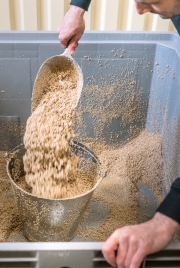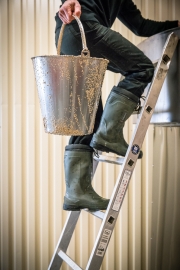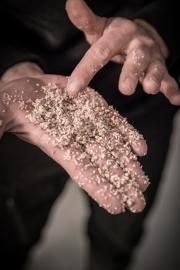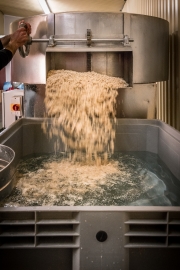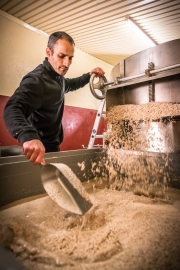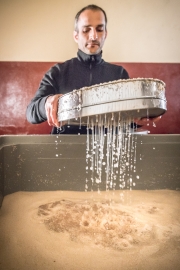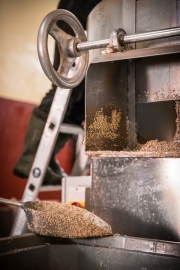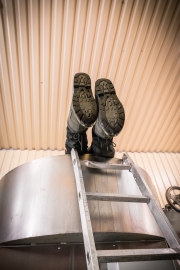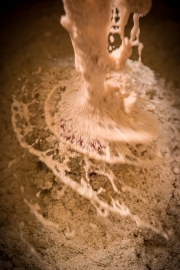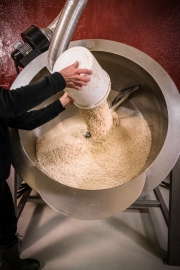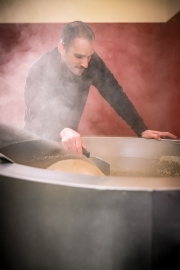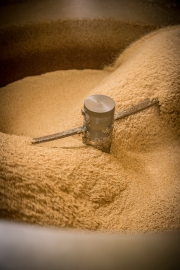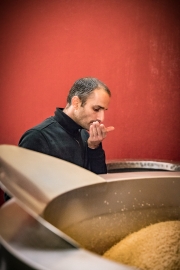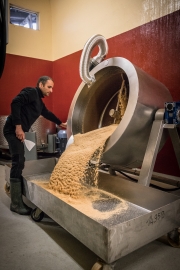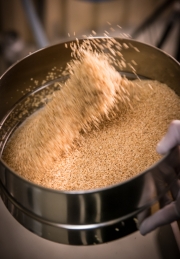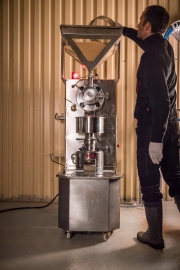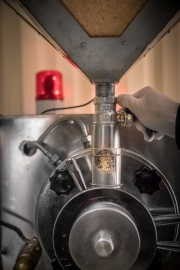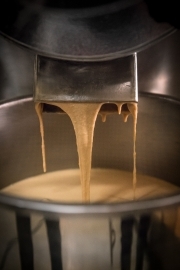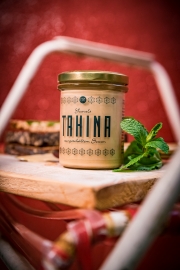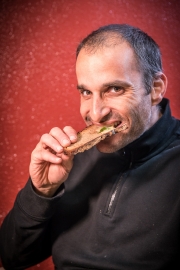Yuval Koenigstein stands in his production facility in Breitbrunn am Ammersee. In his hand he holds a glass of Tahina, freshly labeled and ready for shipping. The paste made from finely ground sesame seeds conquers the market of vegetarians and vegans. Rich in vitamins B1, B2 and B6, Tahina contains a lot of calcium (783 mg per 100g) and provides the body with sustained energy. Nevertheless, Tahina is currently still a niche product. “That will change,” says Yuval Königstein firmly convinced.

The trip
It was a long journey for Yuval Koenigstein to the here and now. Growing up with five siblings on a farm in Beit Hillel, in northern Israel, Yuval Koenigstein moved to Vienna after studying electrical engineering. There he worked as a software product developer. With his partner Anna Schoeppe, they went on to Munich. The desire for change came with the birth of his daughter.
Why Tahina?
“Tahina has always been at home, almost as a basic product. Since we live in Germany, we have not found a good Tahina, “says Yuval Koenigstein. In addition came the desire to hold an own product in the hands. The logical consequence was:
“We make our own Tahina.”
Every beginning is hard
The beginning of the Tahina production began two years ago in the domestic kitchen in a very simle way. The second station was the garden of the father-in-law. Yuval Koenigstein had meanwhile bought a stone mill. But soon it was clear that a proper work place had to come from. Since for one and a half years, Yuval Koenigstein has been working on the production of his Tahina in Breitbrunn am Ammersee on the site of the Perger Winery.
Through the German paragraph jungle
Yuval Koenigstein conscientiously struggled through German food production requirements and has now established a production facility that is on top. But in retrospect, he says: “Without the help of Johannes von Perger it would have been very complicated.”
Without instructions
Machines whose meaning does not make sense immediately are in the small hall in Breitbrunn. Many are from Turkey, as the large producers are based there for Tahina. They were usually delivered without instructions. It was a learning by doing. Yuval Koenigstein knew how to taste Tahina, but how to make it was also a mystery to him.
“It took a long time to learn. Every production is a big challenge. This is craft. If you are not attentive – everything can be in vain.”
Open Sesame
Throughout his career as a Tahina producer, he has so far completely messed up just two batches, each containing 75 kilograms of fresh sesame seeds. “With that you could not even attract the horses in the adjoining stables.” Only with the saying “Sesame Open”, known from Ali Baba and the forty robbers, the sesame is not so easy to get over, so that he reveals his vitality richness.
Yuval Königstein starts early in the morning. It takes seven to eight hours before sesame seeds finally become Tahina. He chose sesame from Ethiopia for processing. Ethiopia is known for its sesame in organic quality and yet every time the delivery must be controlled. For Tahina it must be the best quality, in contrast to the sesame, which our bakers sprinkle on bread rolls and breads.
First, the sesame must be soaked. Then it goes into the peeling machine. Good eyes are needed to determine the degree of peeling of sesame. From three meters high, it then goes in several steps in the salt water. The shells sink down, the seeds stay up. In the next basin, the seeds are washed – this is where the salt content of the Tahina decides. “There is no rule of thumb on how often you have to water. It’s different every time, and that requires a lot of experience, “explains Mr. Koenigstein. In an oversized drum, the sesame is now thrown first.
From there it goes into the heat. Here the sesame dries slowly to itself. It is steaming. After some time, a familiar smell rises – it smells of roasted almonds from the fair. Time to measure the temperature of sesame. Now it’s time to be careful. Yuval Koenigstein needs to get the right roast grade of sesame to reach the ultimate Tahina taste.
Done! Then the sesame, spread out in a large tub, cools down before going on to the mill. After two grinding processes, Yuval Koenigstein tests his production today and is satisfied.
“It’s a lot of work, but you can taste it.”
No end in sight
The journey is not over yet. Yuval Koenigstein has mastered many milestones and slowly Yuvals Tahina from the Koenigsteinmuehle develops into a brand. There are also a few repeat customers who regularly source the Tahina through the website – including us in the future. Now it is time to conquer the German market. We wish Yuval Koenigstein good luck and are now hungry for peas hummus!

